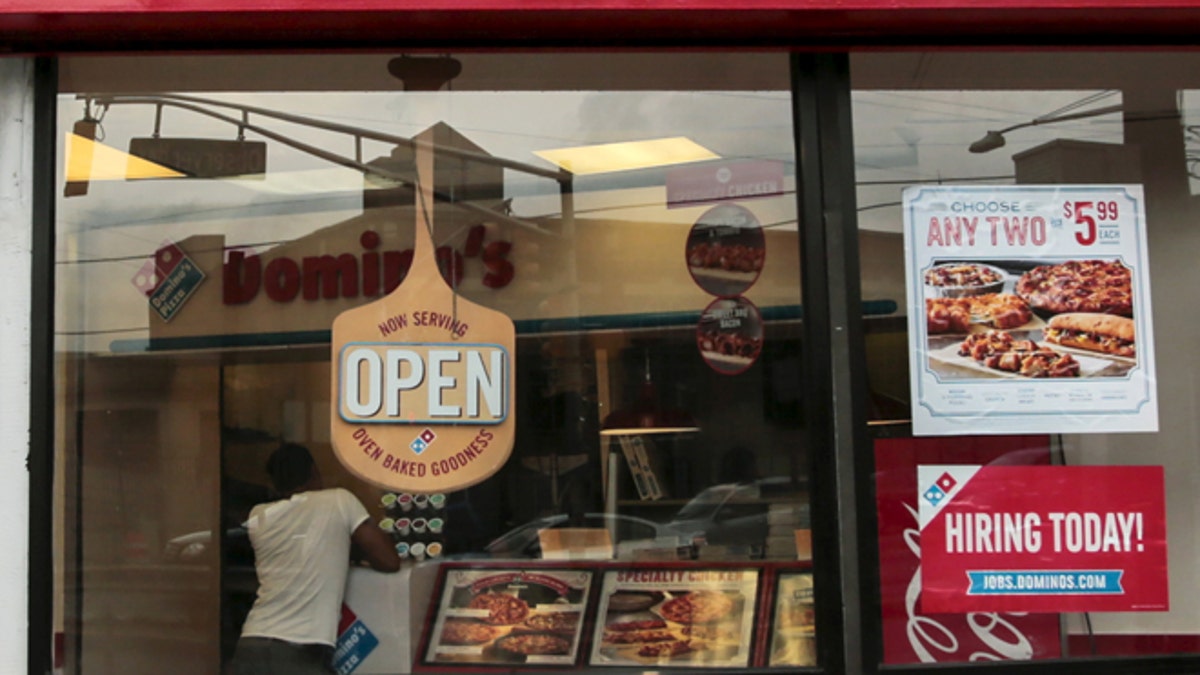
July 8, 2015: A man buys food at Domino's restaurant in Hoboken, N.J. (Reuters)
The pizza lobby is mounting a double-extra-large battle against looming government regulations that would force their franchises to post a dizzying array of calorie counts on their menus.
Under ObamaCare, a Food and Drug Administration rule would require restaurants and food retail shops with over 20 locations, like pizza delivery chains, to post in-store menus displaying nutritional information.
Pizza chains argue this would be particularly tough for them, and take extraordinarily large menu boards. Domino’s Pizza claims it offers 34 million different pie combinations; Pizza Hut boasted last year it can make 2 billion different pizzas. While the FDA has suggested restaurants can institute calorie “ranges” for each pizza, one Domino’s franchise owner in Missouri guessed it would cost him $5,000 to build the boards -- though over 90 percent of Domino’s business comes in over the phone or online, and so most customers never see the in-store board.
“You can’t possibly fit all the iterations of pizza on a typical menu board like you can for burgers, for example,” Lynn Liddle, executive vice president of communications for Domino’s, said in testimony before Congress in June. According to this Domino's video, menu boards are used in less than 1.5 percent of their total orders each day. She told FoxNews.com Thursday that Domino's has been providing nutritional information voluntarily online for 10 years.
“I think what we’re doing is the right thing for our consumers and for the small business owners, so they do not have to pay for a big static menu board that won't help the consumer anyway,” said Liddle, who also represents the American Pizza Community -- a consortium including Pizza Hut, Little Caesars and Papa John’s now lobbying to relax the rules under proposed legislation.
The Common Sense Nutrition Disclosure Act of 2015 was introduced in April by Rep. Cathy McMorris Rodgers, R-Wash., and Rep. Loretta Sanchez, D-Calif., who has called the new rules “an overreach.” The bill, currently awaiting action in the House Energy and Commerce Committee, would allow stores that mostly deliver to provide calorie information online and through mobile apps instead.
“This is commonsense legislation that provides access to caloric information in a practical and flexible manner by clarifying, not significantly altering, this complicated regulation,” said Rodgers in June.
She said the FDA regulations on restaurant labeling were 400 pages long and overly complicated, putting an unfair burden on pizza franchises. “Requiring Domino’s franchisees to post in their stores every potential topping combination – more than 34 million possible outcomes – when more than 90 percent of their orders take place over the phone or Internet – just doesn’t make sense,” she said.
According to the FDA’s website, the proposed rule, which will not only cover franchise restaurants but convenience stores, “will fill a critical information gap and help consumers make informed and healthful dietary choices.” The deadline for compliance was extended to Dec. 1, 2016. Further, “the FDA will work flexibly and collaboratively with individual companies making a good faith effort to comply with the law.”
Not everyone sees the need to deliver aid to the pizza franchises. Karen Raskopf, chief communications officer at Dunkin’ Brands, which oversees Dunkin’ Donuts and Baskin-Robbins franchises, says the uniform labeling provisions are fair and no one should be exempt. Their stores already are instituting the labeling to meet the old December 2015 deadline, she said in June. Their natural competitors would be convenience stores that sell breakfast and lunch items.
“Congress decided that restaurant type foods should bear calorie labeling, regardless of where they are sold. In the interest of creating a level playing field for these types of foods, we emphatically agree.”
Rep. Jan Schakowsky, D-Ill.., said at the time she did not understand why pizza companies did not want to comply with the rules as written, given the importance for public health. “I don’t quite understand the problem here,” she said during the hearing. “These arguments are just silly to me.”
FoxNews.com's Kelley Vlahos contributed to this report.












































